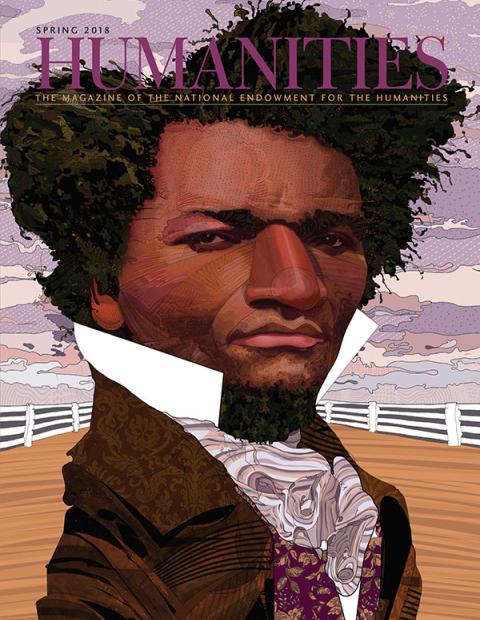Like humanities councils in other states, Humanities Tennessee can be hard to capture in a nutshell. But when asked to describe a special moment, says its executive director, Tim Henderson, there is “one that always comes to mind.” In October 2013, Humanities Tennessee held its annual Southern Festival of Books—a three-day book festival in Nashville. That year, “we had Rick Riordan, who’s a popular young adult writer, on a Sunday afternoon. Getting to the plaza on Sunday morning,” Henderson says, “we saw a line of kids start to form. It wrapped all the way around our plaza, out to the street, and around three blocks.”
“By the time he walked out on the stage, in the War Memorial Auditorium on a late Sunday afternoon, a thousand-plus kids stood up and cheered.” That was “a real example of why we have to do this. It is an opportunity that a lot of these kids might not otherwise get,” Henderson says. They were “celebrating being part of the readerly community.”
That stirring look at the next generation of readers took place less than a year after Henderson became executive director in late 2012. He joined the staff of the Tennessee Humanities Council (as it was then known) in 1998, with master’s degrees in English literature and information science, and became director of operations in 2004. When the council’s longtime executive director, Robert Cheatham, announced that he was retiring, “the board did a national search,” says Henderson. “I decided to try for it.”
Once he became executive director, “one of the first directives from the board was, as I would put it, ‘keep the ship afloat,’” he says. “We were doing a lot of programs that worked really well.” At the same time, “there was also an emphasis on seeking new partners, new resources for the council, and new funding opportunities—for things that we already were doing, and initiatives that we might be interested in taking on.”
Humanities Tennessee groups its programs into two categories—“literature and language” and “history and culture.” Literature is a natural focus, says Henderson, because “Tennessee has a very strong literary community.” In addition to the long-running book festival (it turns 30 this year), Humanities Tennessee conducts many programs in this area, including the Tennessee Young Writers’ Workshop and Appalachian Young Writers’ Workshop, which are weeklong summer programs. The council also supports an online literary publication, Chapter 16, so named because Tennessee is the sixteenth state.
Chapter 16 was founded in 2009 to fill a gap, after many Tennessee newspapers stopped carrying local book coverage. At the time, “if authors were coming to town, you may or may not find out about that,” Henderson says. Now, Chapter 16 provides Tennessee-related author interviews, book news, and feature stories on a daily basis. Several Tennessee newspapers, with a collective Sunday circulation of about half a million readers, reprint some of its items. “It’s really been striking to me around the state,” says Henderson. “I can talk to people in Knoxville about Humanities Tennessee, and while they may not have attended the Southern Festival of Books in Nashville, if I say, ‘Well, we do Chapter 16,’ that is something that they’ve heard of, because they read that in the paper.”
Humanities Tennessee sponsors “history and culture” programs on the Civil War—a popular session topic at the book festival—and, for the 2015 sesquicentennial of the war’s end, an exploration of emancipation. Memphis houses the National Civil Rights Museum, and Nashville has its own civil rights history, too. But the council also explores other historical topics. Its new Neighborhood Story Project, which is still in the pilot stage, takes a look at very local history. In the first phase, participants from three Nashville neighborhoods worked with facilitators to identify and explore questions related to neighborhood changes, including gentrification, and then produced a film, a comic book, and an exhibition. The next step will be to expand the program to other areas, including rural communities.
Recently, the council has partnered with an independently led, statewide initiative, March to the 19th, organized by the Nashville group Chick History. In 1920, Tennessee became the thirty-sixth state to ratify the 19th Amendment—the legislature did it by a single vote—thus making the amendment part of the Constitution. March to the 19th looks forward to the centennial of American women’s right to vote, to be celebrated in 2020.
Tell me more,Tim
The Tennessee site everyone should visit is . . . Room 306, Lorraine Motel at the National Civil Rights Museum in Memphis.
When you were a kid, what did you think you wanted to be when you grew up? For years, I was convinced that I would be an oceanographer because I was obsessed with Jacques Cousteau.
Which philosophers would be the best company for you if you happened to be stuck on an island? Søren Kierkegaard and Slavoj Žižek.
Is there a piece of Tennessee’s story that surprises people? Although Tennessee seceded from the U.S. during the Civil War, it also provided more Union soldiers than any other Southern state
My untapped talent is . . . knowledge of 1970s American film. I’m still looking for a way to capitalize on that.


